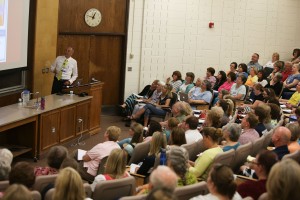
“Humans are processed corn walking around,” Dr. Steven A. Tersigni said.
Curious eyes peered back at him from a jam-packed room of Education Week participants. What did this have to do with the Word of Wisdom?
Tersigni then mentioned the Mayans; they were known as the “corn people.” While many might think of Americans as the “grain people” or the “beef people,” Tersigni claims otherwise. He said that if someone were to sample a person’s tissue, they would find the distinct carbon signature of corn. And they would find an overabundance of it.
“Because of government intervention that dominates our agriculture, corn has found its way into almost everything we eat,” Tersigni said. “And it hooks us.”
He quoted Doctrine and Covenants 89:4, which tells of the “evils and designs which do and will exist in the hearts of conspiring men in the last days.” After reading this scripture, he spoke extensively about today’s food industry.
“They know what they’re doing,” he said of the food industry. “They make food that is hyperpalatable and that will stimulate endorphins so that we’ll eat more and buy more, and they’ll make more money.”
Overabundance and obesity
Obesity is the second leading cause of preventable death, and 61 percent of American adults are overweight. Tersigni suggested using the Word of Wisdom as a guideline to guard oneself against preventable health issues caused by today’s food industry.
He explained the importance of the Word of Wisdom by describing a correlation between the spirit and the body. He said LDS Church members work to acquire godly attributes and make those qualities a part of their very nature. “Attributes like godliness, love, charity and kindness become the composition of our spirit,” he said.
“The same thing happens with our bodies,” he continued. “Right now you and I are mostly corn. But by changing the things we eat, we can change the composition of our bodies to what our Father in Heaven would have it be.”
Avoiding harmful habitual eating
Tersigni said there are three motivators that preempt eating: hunger, reward and environment.
The “reward” motivation often leads people to overeat and/or choose unhealthy foods. Often the “reward” motivator works in cahoots with environment. For example, a stressful newsroom environment may inspire journalists to reward themselves with tasty salt and fat-filled lunches.
Tersigni warned against responding to an environment by rewarding oneself with food. He noted that environmental cues lead to urges, which lead people to succumb to reward and fuel an unhealthy habit. He also acknowledged that genetic predispositions can lead to obesity, but giving in to environmental-based urges only makes things worse.
“The genetics load the gun, and the environment loads the trigger,” he said.
What to eat?
Throughout the class period, Tersigni shared the pros and cons of several well-known diets like the Atkins Diet, the Paleo Diet, the Dash diet, vegetarianism and veganism.
While Tersigni made no official affiliation with any of the diets he mentioned, he warned against health problems that eating animal protein can bring, including increased risk for cancer. He also pointed out that the Word of Wisdom reminds readers three times to eat meat sparingly. He emphasized the benefits of plant-based diets.
“When you think about it, plants are the basis for all dietary nutrients we need,” he said. “Everything starts with a plant. Animals eat plants. And animals eat other animals that eat plants.”
Tersigni also recommended eating fruits in their season, because that is when they are most nutritious. This means no canned fruits. Foods that have an unnaturally long shelf-life are often so because they’re packed with unhealthy preservatives. Tersigni advised that people eat whole foods as much as possible.
“Give your body the right food, and it will do the right thing,” he said.
More Education Week articles:
- Marleen S. Williams: Matters of the mind: Facing life’s trying tests
- Julie Crockett: How your daughter can change the world with an engineering degree
- Elder Bednar: To sweep the Earth as with a flood
- What brings you to Education Week?
- David B. Marsh: Helping those who struggle with doubt
- Water main rupture temporarily shuts down Marriott Center during Education Week
- Tom Holmoe on the state of BYU athletics
- Richard B. Miller: The healing power of forgiveness
- Roger K. Allen: How to talk to your children
- Randal A. Wright teaches how to live purposefully with self-discipline
- Education Week: A Week in Photos (Aug. 22, 2014)
- Education Week at a glance




